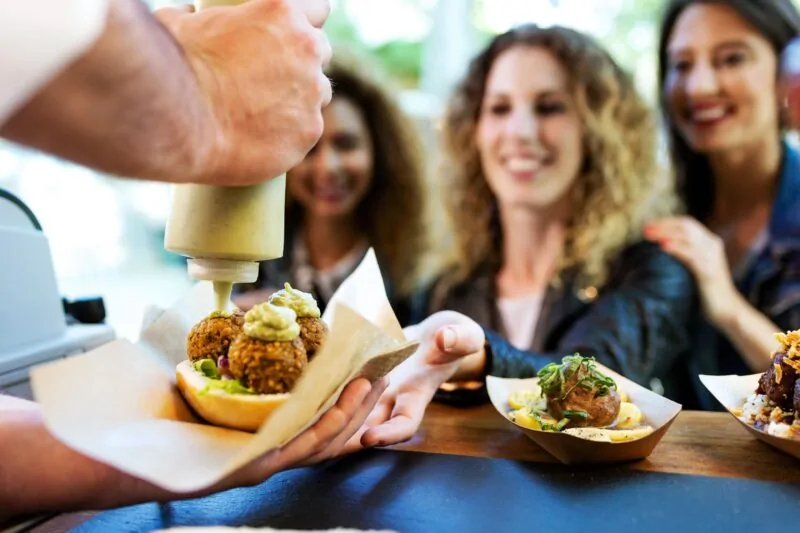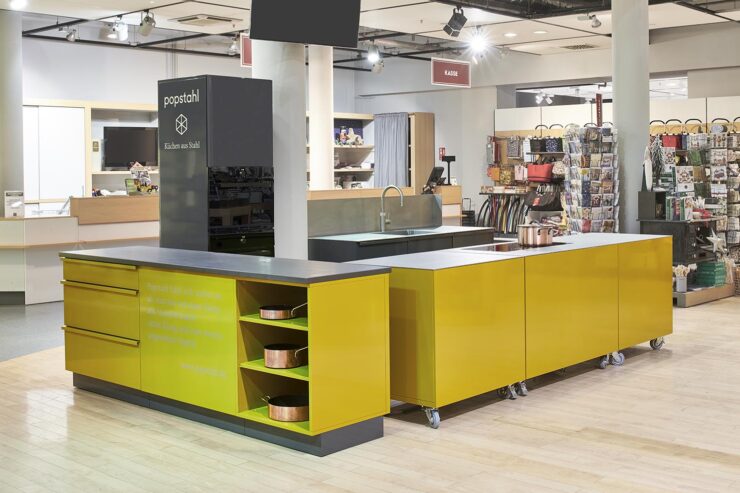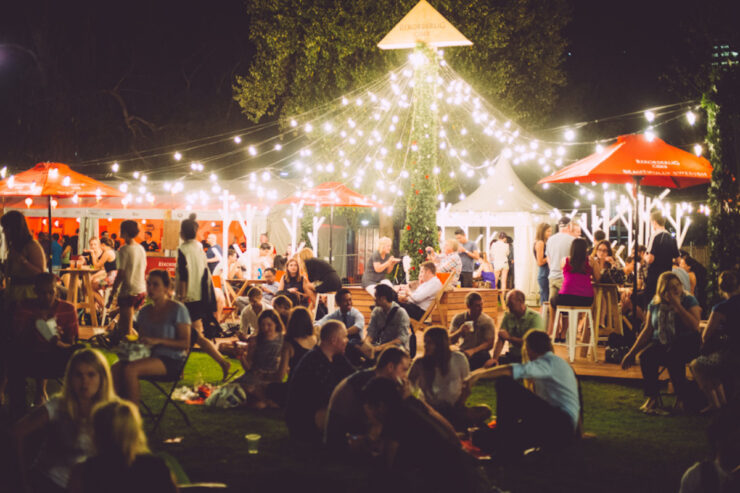Munich carries deep culinary roots built on regional flavors, local produce, and traditional craftsmanship. Beneath its formal dining scene, another world thrives across markets, courtyards, and alleys filled with street food vendors and pop-up kitchens. Each stall tells a story of creativity and passion that reflects modern Munich’s appetite for authenticity and innovation.
If you are traveling alone, an escort service München can make your culinary exploration far more engaging. Company transforms a simple tasting into a shared sensory experience, giving each stop more warmth and enjoyment through conversation and presence.
Street food in Munich differs from that in other European cities through discipline and refinement. Vendors combine precision with inventiveness. Every dish respects traditional Bavarian roots while introducing modern flavor twists that attract locals and visitors alike.
Origins of Munich’s Street Food Movement

Street food in Munich evolved naturally from the city’s market culture. Viktualienmarkt, the oldest and most iconic market, served as the foundation for open-air dining. For generations, merchants and farmers brought regional produce, meats, and baked goods to the city center. The transition from raw goods to prepared food marked the first step toward what later became Munich’s street food identity.
As the city grew more cosmopolitan, younger chefs and independent cooks began to use food trucks and pop-up stalls to test recipes and connect with customers directly. The concept allowed them to bypass expensive restaurant spaces and focus on taste, freshness, and interaction. Munich’s culture of precision found perfect expression through those small, flexible kitchens.
Today, the city’s open-air spaces, weekend festivals, and craft beer events feature countless vendors offering everything from gourmet sausages to vegan dumplings. Each stall adds personality to Munich’s evolving culinary character.
Where to Find the Best Street Food in Munich
Exploring Munich’s street food scene requires curiosity and a bit of planning. Markets and districts across the city reveal different layers of flavor and atmosphere.
Viktualienmarkt
Located just a few steps from Marienplatz, Viktualienmarkt remains the soul of Munich’s open-air food tradition. Its stalls serve freshly baked pretzels, fish sandwiches, roast pork rolls, and seasonal specialties like mushroom dishes in autumn or white asparagus in spring. Beer gardens in the center of the market allow visitors to enjoy meals under chestnut trees while watching the daily rhythm of city life.
Street Food Thursdays at Werksviertel
Werksviertel, an urban district near Ostbahnhof, has become a hub for creativity and design. On Thursdays, the area hosts a popular street food market where local chefs experiment with international influences. You can taste Korean barbecue tacos, Neapolitan-style pizza slices, or handmade dumplings filled with regional ingredients. The setting combines industrial architecture with relaxed social energy that reflects Munich’s new generation of culinary talent.
Summer Tollwood Festival
Held twice a year in Olympiapark, Tollwood combines art, music, and food. Its summer edition transforms the park into a global food village. Dozens of stands prepare dishes inspired by cuisines across Asia, Africa, and Latin America. Organic certification remains central to the event, aligning with Munich’s focus on sustainability and ethical sourcing.
Food Truck Parks and Pop-Up Gatherings
Pop-up events appear frequently in spaces like Alte Utting or Bahnwärter Thiel. Converted industrial structures and former train cars become open-air kitchens filled with aroma and conversation. Rotating chefs bring diversity to each event, ensuring that no two evenings ever feel the same. The setting attracts locals seeking community and travelers searching for discovery through taste.
Street Food Specialties Unique to Munich
Bavarian tradition still forms the foundation of Munich’s street food. Yet the local chefs reinterpret classics through new techniques and ingredients.
Leberkässemmel
Leberkäse, a baked meat loaf made of finely ground pork and beef, serves as the essence of Munich’s quick bites. It is sliced thick, placed in a crusty roll, and served with mustard. Street vendors often elevate it by adding melted cheese, caramelized onions, or fresh pickles for contrast.
Weisswurst and Pretzel Cones
Weisswurst remains the city’s morning delicacy, typically enjoyed before noon. In street markets, it appears in modern versions—grilled and served in a cone made of pretzel dough for easy handling. The combination delivers comfort food in portable form without sacrificing authenticity.
Currywurst with Local Flair
Although Currywurst originated in Berlin, Munich vendors adapted it through higher-quality sausage and refined sauces. Some stalls use beer-based reductions or mustard blends created by local producers. The dish unites the fast-food format with the craftsmanship associated with Bavarian cooking.
Vegan and Fusion Innovations
Munich’s younger chefs push boundaries by merging international influences with local produce. Vegan curry plates, mushroom bao buns, and alpine cheese tacos show how global trends meet Bavarian sensibility. The city’s preference for balance ensures every innovation respects flavor precision rather than novelty alone.
The Social Character of Munich’s Pop-Up Kitchens

Pop-up kitchens form the city’s most dynamic culinary trend. Unlike fixed food stalls, they appear temporarily at festivals, design fairs, or private courtyards. Chefs use them as creative laboratories to test new menus, interact with guests, and build recognition before opening permanent restaurants.
Each pop-up brings community spirit to life. Tables gather strangers under shared light strings and soft music. Conversations start naturally through the food itself. That sense of connection defines Munich’s modern dining landscape—intimate, respectful, and rooted in real interaction rather than spectacle.
For those seeking companionship during those explorations, Louisa Escort can complement the atmosphere through calm, cultured company that enhances conversation and sensory appreciation. The fusion of food and presence forms an experience that goes beyond simple tasting.
How Beer Culture Complements Street Food
Munich’s beer heritage naturally intertwines with its street food. Breweries like Augustiner, Paulaner, and Hacker-Pschorr supply local stalls and festivals. Many vendors pair their dishes with specific beer styles to create harmony between flavor profiles.
Crisp lagers accompany grilled meats, wheat beers match well with spicy dishes, and darker varieties suit roasted or smoked ingredients. Visitors can explore countless combinations at beer gardens and festivals without the formality of traditional restaurants. The relaxed pairing underscores how Munich’s culinary identity rests on community rather than consumption alone.
Sustainability and Local Ingredients
Munich’s focus on sustainability sets a clear standard for its street food scene. Many vendors source ingredients directly from nearby farms within Bavaria. Local produce not only supports regional agriculture but also ensures freshness and traceability.
Waste reduction programs have grown alongside the food movement. Compostable containers, reusable cutlery, and bio-based packaging dominate modern stalls. The city government provides incentives for sustainable operations, reinforcing Munich’s position as a model for responsible urban dining.
The Role of Music and Design in Food Events

Street food events in Munich incorporate artistic elements beyond cuisine. Music, lighting, and design play an equal role in defining the mood. Local bands, acoustic duos, and jazz ensembles often perform near open-air bars, giving rhythm to the dining atmosphere.
Designers collaborate with event organizers to shape visual harmony between stalls, décor, and seating arrangements. The result feels immersive—less like a market, more like a curated experience that celebrates creativity across multiple senses.
Seasonal Food Festivals to Explore
Spring: Frühlingsfest
The smaller sibling of Oktoberfest focuses on local stalls, beer tents, and food trucks. Visitors enjoy roasted meats, pastries, and craft beverages. It signals the start of Munich’s outdoor food season.
Summer: Streetlife Festival
Held along Leopoldstrasse, this event turns one of Munich’s main avenues into an open kitchen filled with aromas from around the world. Environmental groups also participate, highlighting sustainable dining practices that align with Munich’s green policies.
Autumn: Oktoberfest and Beyond
Although best known for beer, Oktoberfest features food at equal importance. Pretzels the size of plates, roasted chicken, and grilled fish define the celebration. Smaller autumn pop-ups across the city continue the momentum after the festival ends.
Winter: Christmas Markets
Winter transforms Munich into a scene of glowing lights and festive stalls. Marienplatz, Schwabing, and Chinesischer Turm markets serve mulled wine, sausages, roasted nuts, and pastries. Each market adds regional flavor that keeps warmth alive through cold months.
Final Reflection
Munich’s street food and pop-up kitchens represent evolution within tradition. Each stall reflects respect for craftsmanship, connection, and creativity. The city sustains a delicate balance between order and spontaneity, producing flavors that carry both history and modern expression.
